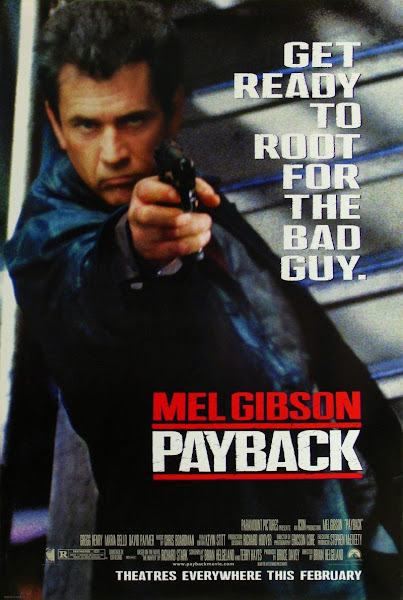Payback (Film Review)

1999 Paramount Pictures
Directed by: Brian Helgeland; Written by: Brian Helgeland and Terry Hayes
Starring: Mel Gibson, Gregg Henry, Maria Bello, and David Paymer
MPAA Rating: R; Running Time: 101 Minutes
The Nicsperiment Score: 7/10
After a big heist, Porter is shot, robbed, and left for dead by his partner in crime, Val, and his wife, Lynn. Unfortunately for Val, Lynn, and everyone associated with them, Porter isn't dead. After several months, the angry, vengeful Porter turns up very alive. He wants his $70,000 back. He wants... Payback.
Brian Helgeland's 1999 directorial debut, Payback, is a love letter to 1970s crime thrillers. With a dark blue filter over his lens, and grime caked over his sets and his characters' moral compasses, frequent scribe Helgeland seems to relish his first chance behind the camera. Even the majority of elements where the studio took control out of Helgeland's hands, like the addition of a hard-boiled voiceover or a more cathartic, palatable ending, generally work. As Porter, Mel Gibson seems to relish putting a darker twist on his action hero persona, believable as he commits several acts of surprising physical violence, yet still charming and likable. As Porter's hooker-with-a-heart-of-gold post-wife love interest, Rosie, Maria Bello brings just the right balance of toughness and charm, herself, while Gregg Henry brings a wonderful level of slime to the villainous Val. Speaking of villainous, Payback features a murderers row of bad guys, from James Coburn to William Devane to Lucy Liu to David Paymer to the one and only Kris Kristofferson, all chewing the delicious scenery. Chris Boardman's dark and gritty musical score and Ericson Core's phenomenal cinematography are also feathers in the film's cap, and as much a love letter to 70s cinema as Helgeland's writing and directing.
However, there are a few moments that hold Payback from greatness, keeping it firmly in the "good" territory. One studio-inserted action beat features Gibson sneaking under some henchmen's car, cutting the fuel line and setting the gasoline trail on fire to blow up the car, in a cartoony sequence that clashes violently with the rest of the film's grittier, more realistic tone. Another moment, created by Heldgeland himself, wraps up several of the film's pre-climax loose ends in a clumsy fashion, and could have been handled with much more subtlety. Thankfully, these moments don't come often, and the majority of the film is a highly enjoyable experience, emblematic of many of the throwback charms much of 1999 cinema has to offer.


Comments